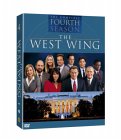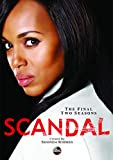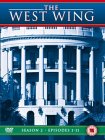 The West Wing - Complete Season 1 | DVD | (17/04/2019)
from £12.19
| Saving you £49.80 (408.53%)
| RRP
The West Wing - Complete Season 1 | DVD | (17/04/2019)
from £12.19
| Saving you £49.80 (408.53%)
| RRP Aaron Sorkin's American political drama The West Wing is more than mere feel-good viewing for sentimental US patriots. It is among the best-written, sharpest, funniest and most moving American TV series of all time. In its first series, The West Wing established the cast of characters comprising the White House staff. There's Chief of Staff Leo McGarry (John Spencer), a recovering alcoholic whose efforts to be the cornerstone of the administration contribute to the break-up of his marriage. CJ (Alison Janney) is the formidable Press Spokeswoman embroiled in a tentative on-off relationship with Timothy (Thirtysomething) Busfield's reporter. Brilliant but grumpy communications deputy Toby Ziegler, Rob Lowe's brilliant but faintly nerdy Sam Seaborn and brilliant but smart-alecky Josh Lyman make up the rest of the inner circle. Initially, the series' creators had intended to keep the President off-screen. Wisely, however, they went with Martin Sheen's Jed Bartlet, whose eccentric volatility, caution, humour and strength in a crisis make for such an impressively plausible fictional President that polls once expressed a preference for Bartlet over the genuine incumbent. The issues broached in the first series have striking, often prescient contemporary relevance. We see the President having to be talked down from a "disproportionate response" when terrorists shoot down a plane carrying his personal doctor, or acting as broker in a dangerous stand-off between India and Pakistan. Gun control laws, gays in the military and fundamentalist pressure groups are all addressed--the latter in a most satisfying manner ("Get your fat asses out of the White House!")--while the episode "Take This Sabbath Day" is a superb dramatic meditation on capital punishment. Handled incorrectly, The West Wing could have been turgid, didactic propaganda for The American Way. However, the writers are careful to show that, decent as this administration is, its achievements, though hard-won, are minimal. Moreover, the brisk, staccato-like, almost musical exchanges of dialogue, between Josh and his PA Donna, for instance, as they pace purposefully up and down the corridors are the show's abiding joy. This is wonderful and addictive viewing. --David Stubbs
 The West Wing - Complete Season 3 | DVD | (29/03/2004)
from £5.99
| Saving you £54.00 (901.50%)
| RRP
The West Wing - Complete Season 3 | DVD | (29/03/2004)
from £5.99
| Saving you £54.00 (901.50%)
| RRP There is no letdown in talent or skill for the third season of this blue ribbon drama. One could say these 22 episodes play as a continuation of the second season; there are no major new characters or earth-shattering plots and the Emmys rewarded the series with its third straight award for Best Drama (and unlike season 4, no one argued about the laurels). The third year starts with a stand-alone episode "Isaac & Ishmael", a special show created, shot, and broadcast 22 days after the 9/11 events. Although the final results tend to be sermonic, the fact the show was able to drop everything and commit to a new season opener is evident not only of talent, but of a disciplined work force operating at the top of their game. President Bartlet's (Martin Sheen) decision to run for reelection after the disclosure of suffering MS fuels the fire for the first half of the season. Depositions are filed against the staff, minor mistakes take on more significance, and the White House consul (Oliver Platt) has the run of the table warning of worst-case scenarios. The focus soon turns to the First Lady (Stockard Channing) as the potential "Lady Macbeth" of the scandal. Channing aces her role and turns her birthday celebration ("Dead Irish Writers") into one of the season's highlights. Assistant Donna (Janel Moloney), her boss Josh Lyman (Bradley Whitford), and press secretary C.J. (Alison Janney) all have charismatic romances, but the ace supporting player this year is John Spencer as the relentlessly loyal Chief of Staff Leo McGarry. Whether delivering the hard truth, accepting the proverbial bullet for the President, or being our guide to how Bartlet ran in the first place (in another wonderful flashback episode, "Bartlet for America"), all roads lead to McGarry. Acting Emmys went to Channing, Spencer, and Janney, but the strength of this show is that the entire cast has glorious moments (Toby's taking on the President's mode of operation, Sam's belief in government, or the President's peculiarities of Thanksgiving are just a few). Recurring guest stars--the likes of Ron Silver, Tim Matheson, Mary Louise Parker, and Mark Harmon--deliver some of their career-best work. Crack writing, a breathless pace, plus you learn a bit about government. What else do you want from a TV drama? --Doug Thomas
 The West Wing - Complete Season 4 | DVD | (27/09/2004)
from £8.95
| Saving you £53.04 (592.63%)
| RRP
The West Wing - Complete Season 4 | DVD | (27/09/2004)
from £8.95
| Saving you £53.04 (592.63%)
| RRP The fourth season of intrigue within the Bartlet administration. 1. 20 Hours In America: Part I 2. 20 Hours In America: Part II 3. College Kids 4. The Red Mass 5. Debate Camp 6. Game On 7. Election Night 8. Process Stories 9. Swiss Diplomacy 10. Arctic Radar 11. Holy Night 12. Guns Not Butter 13. The Long Goodbye 14. Inauguration: Part I 15. Inauguration: Over There 16. The California 47th 17. Red Haven's On Fire 18. Privateers 19. Angel Maintenance 20. Evidence Of
![View from the Top [DVD]](/pictures/1108331.jpg) View from the Top | DVD | (16/05/2011)
from £19.49
| Saving you £0.50 (2.57%)
| RRP
View from the Top | DVD | (16/05/2011)
from £19.49
| Saving you £0.50 (2.57%)
| RRP This breezy comedy from director Bruno Barreto stars Gwyneth Paltrow as Donna a young woman who dreams of escape from her rural Nevada home town. Her life changes when she sees Sally Weston (Candice Bergen) on TV talking about her book My Life in the Sky and her fabulous career traveling the world as a flight attendant. Soon the plucky Donna has a job at a small Nevada airline that caters to gamblers and drunks and along with fellow trainees Sherry (Kelly Preston) and Christine (Christina Applegate) dreams of working the international routes on a large airline. That opportunity arises when Royalty Airlines holds a job fair where the girls are drilled by former airline attendant John Whitney (Mike Myers). Soon Donna and Christine find themselves in training at Royalty's home base with the manic Whitney where the ambitious Donna makes it clear that she's headed for the international routes by acing all of Whitney's tests. However Donna finds that success doesn't come without its pitfalls when she ends up stationed in Cleveland where she strikes up a romance while still dreaming about jetting around Europe as a first class flight attendant...
 Scandal: The Complete Sixth & Seventh Season | DVD | (28/08/2018)
from £N/A
| Saving you £N/A (N/A%)
| RRP
Scandal: The Complete Sixth & Seventh Season | DVD | (28/08/2018)
from £N/A
| Saving you £N/A (N/A%)
| RRP ![View From the Top [2002]](/pictures/1014593.jpg) View From the Top | DVD | (10/05/2004)
from £6.73
| Saving you £8.26 (122.73%)
| RRP
View From the Top | DVD | (10/05/2004)
from £6.73
| Saving you £8.26 (122.73%)
| RRP Gwyneth Paltrow stars in this new comedy as a young woman from meager beginnings who dreams of becoming a first class international flight attendant
 The West Wing - Season 1 Part 1 | DVD | (08/04/2002)
from £N/A
| Saving you £N/A (N/A%)
| RRP
The West Wing - Season 1 Part 1 | DVD | (08/04/2002)
from £N/A
| Saving you £N/A (N/A%)
| RRP Aaron Sorkin's American political drama The West Wing, set in the White House, has won innumerable awards--and rightly so. Its depiction of a well-meaning Democrat administration has warmed the hearts of countless Americans. However, The West Wing is more than mere feel-good viewing for sentimental patriots. It is among the best-written, sharpest, funny and moving American TV series of all time. In its first series, The West Wing established the cast of characters who comprise the White House staff. There's Chief of Staff Leo McGarry (John Spencer), a recovering alcoholic whose efforts to be the cornerstone of the administration contribute to the break-up of his marriage. CJ (Alison Janney) is the formidable Press Spokeswoman embroiled in a tentative on-off relationship with Timothy (Thirtysomething) Busfield's reporter. Brilliant but grumpy communications deputy Toby Ziegler, Rob Lowe's brilliant but faintly nerdy Sam Seaborn and brilliant but smart-alecky Josh Lyman make up the rest of the inner circle. Initially, the series' creators had intended to keep the President off-screen. Wisely, however, they went with Martin Sheen's Jed Bartlet, whose eccentric volatility, caution, humour and strength in a crisis make for such an impressively plausible fictional President that polls once expressed a preference for Bartlet over the genuine incumbent. The issues broached in the first series have striking, often prescient contemporary relevance. We see the President having to be talked down from a "disproportionate response" when terrorists shoot down a plane carrying his personal doctor, or acting as broker in a dangerous stand-off between India and Pakistan. Gun control laws, gays in the military, Fundamentalist pressure groups are all addressed--the latter in a most satisfying manner ("Get your fat asses out of the White House!")--while the episode "Take This Sabbath Day" is a superb dramatic meditation on Capital punishment. Handled incorrectly, The West Wing could have been turgid, didactic propaganda for The American Way. However, the writers are careful to show that, decent as this administration is, its achievements, though hard-won, are minimal. Moreover, the brisk, staccato-like, almost musical exchanges of dialogue, between Josh and his PA Donna, for instance, as they pace purposefully up and down the corridors are the show's abiding joy. This is wonderful and addictive viewing.--David Stubbs
![The West Wing - Complete Seasons 1 and 2 [2001]](/pictures/1018628.jpg) The West Wing - Complete Seasons 1 and 2 | DVD | (17/11/2003)
from £79.99
| Saving you £2.00 (2.50%)
| RRP
The West Wing - Complete Seasons 1 and 2 | DVD | (17/11/2003)
from £79.99
| Saving you £2.00 (2.50%)
| RRP Aaron Sorkin's American political drama The West Wing is more than mere feel-good viewing for sentimental US patriots. It is among the best-written, sharpest, funny and moving American TV series of all time. In its first series, The West Wing established the cast of characters who comprise the White House staff. There's Chief of Staff Leo McGarry (John Spencer), a recovering alcoholic whose efforts to be the cornerstone of the administration contribute to the break-up of his marriage. CJ (Alison Janney) is the formidable Press Spokeswoman embroiled in a tentative on-off relationship with Timothy (Thirtysomething) Busfield's reporter. Brilliant but grumpy communications deputy Toby Ziegler, Rob Lowe's brilliant but faintly nerdy Sam Seaborn and brilliant but smart-alecky Josh Lyman makes up the rest of the inner circle. Initially, the series' creators had intended to keep the President off-screen. Wisely, however, they went with Martin Sheen's Jed Bartlet, whose eccentric volatility, caution, humour and strength in a crisis make for such an impressively plausible fictional President that polls once expressed a preference for Bartlet over the genuine incumbent. The second series of The West Wing takes up where the first one left off and, a few moments of slightly toe-curling patriotic sentimentalism apart, maintains the series' astonishingly high standards in depicting the everyday life of the White House staff of a Democratic administration. With Aaron Sorkin's dialogue ranging as ever from dry, staccato mirth to almost biblical gravitas, an ensemble of overworked (and curiously undersexed) characters and an overall depiction of the workings of government that's both gratifyingly idealised yet chasteningly realistic, The West Wing is one of the all-time great American TV dramas. --David Stubbs
 The West Wing - Season 2 Part 1 | DVD | (07/04/2003)
from £6.98
| Saving you £31.00 (621.24%)
| RRP
The West Wing - Season 2 Part 1 | DVD | (07/04/2003)
from £6.98
| Saving you £31.00 (621.24%)
| RRP The second series of The West Wing takes up literally where the first series left off and, after a few moments of slightly toe-curling patriotic sentimentalism, maintains the series' astonishingly high standards in depicting the everyday life of the White House staff of a Democratic administration. The two-part opener covers the immediate aftermath of the assassination attempt on President Bartlet (Martin Sheen), switching between the anxious wait on the injured and flashbacks to Bartlet's campaign for the Presidency. Other peaks in a series exceedingly short on troughs include "Noel", the episode in which Alan Arkin's psychiatrist forces Josh Lynam to confront his post-traumatic stress disorder and the concluding episodes in which President Bartlet, having lost his secretary Mrs Landingham in a tragic car accident, rails angrily against God in Latin. Other new features of this series include the introduction of Ainsley Hayes, a young Republican counsel hired after she beats communications deputy Sam Seaborn (Rob Lowe) in a TV debate ("Sam's getting his ass kicked by a girl!" crow his colleagues), as well as the revelation (to us first, then later his staff) that the President has been suffering from multiple sclerosis. Meanwhile, the White House must move heaven and earth to make incremental political gains as well as deal with a host difficulties abroad, demonstrating, some might argue, more compassion, skill and restraint than that exercised by the real-life US administration. With Aaron Sorkin's dialogue ranging as ever from dry, staccato mirth to almost biblical gravitas, an ensemble of overworked (and curiously undersexed) characters and an overall depiction of the workings of government that's both gratifyingly idealised yet chasteningly realistic, The West Wing is one of the all-time great American TV dramas. --David Stubbs
 The West Wing - Season 2 Part 2 (Episodes 12 To 22) | DVD | (28/07/2003)
from £N/A
| Saving you £N/A (N/A%)
| RRP
The West Wing - Season 2 Part 2 (Episodes 12 To 22) | DVD | (28/07/2003)
from £N/A
| Saving you £N/A (N/A%)
| RRP The second series of The West Wing, Aaron Sorkin's relentlessly erudite drama about life behind the scenes at the White House, continues here with the emphasis on President Bartlet's multiple sclerosis, a condition that he has hitherto concealed from the American electorate and most of his staff. Tensions grow between himself and the First Lady (Stockard Channing) as she realises, in the episode "Third State of the Union" that he intends to run for a second term in office. It becomes clear to Bartlet (Martin Sheen) that he must go public with his MS, and his staff are forced to come to terms with this, as well as deal with the usual plethora of domestic and international incidents, which apparently preclude any of them from having any sort of private lives, least of all love lives. These include crises in Haiti and Columbia, an obstinate filibuster and a Surgeon General's excessively frank remarks about the drugs situation. Thankfully, the splendid Lord John Marbury (Roger Rees) is on hand to make chief of staff Leo McGarry's life more of a misery in "The Drop-In". These episodes, though occasionally marred by a sentimental soundtrack and an earnest and wishfully high regard for the Presidential office, are masterclasses in drama and dialogue, ranging from the wittily staccato to the magnificently grave, capturing authentically the hectic pace of political intrigue and the often vain efforts of decent, brilliant people to do the right thing. "Two Cathedrals", which features flashbacks to Bartlet's schooldays and his thunderous denunciation of God following a funeral, is perhaps the greatest West Wing episode of all. On the DVD: The West Wing, Series 2 Part 2 features no extras, though the transfer is immaculate. --David Stubbs
 The West Wing - Season 1 Part 2 | DVD | (22/07/2002)
from £N/A
| Saving you £N/A (N/A%)
| RRP
The West Wing - Season 1 Part 2 | DVD | (22/07/2002)
from £N/A
| Saving you £N/A (N/A%)
| RRP Aaron Sorkin's American political drama The West Wing, set in The White House, has won innumerable awards--and rightly so. Its depiction of a well-meaning Democrat administration has warmed the hearts of countless Americans. However, The West Wing is more than mere feel-good viewing for sentimental patriots. It is among the best-written, sharpest, funny and moving of recent American TV series. In its first series, The West Wing established the cast of characters who comprise the White House staff. There's Chief of Staff Leo McGarry (John Spencer), a recovering alcoholic whose efforts to be the cornerstone of the administration contribute to the break up of his marriage. CJ (Alison Janney) is the formidable press spokeswoman embroiled in a tentative on-off relationship with Timothy Busfield's reporter. Brilliant but grumpy communications deputy Toby Ziegler, Rob Lowe's brilliant but faintly nerdy Sam Seaborn and brilliant but smart-alecky Josh Lynam make up the rest of the inner circle. Initially, the series' creators had intended to keep the President off-screen. Wisely, however, they went with Martin Sheen's Jed Bartlet, whose eccentric volatility, caution, humour and strength in a crisis make for such an impressively plausible fictional President that polls once expressed a preference for Bartlet over the genuine incumbent. Handled incorrectly, The West Wing could have been turgid, didactic propaganda for The American Way. However, the writers are careful to show that, decent as this administration is, its achievements, though hard-won, are minimal. Moreover, the brisk, staccato-like, almost musical exchanges of dialogue, between Josh and his PA Donna, for instance, as they pace purposefully up and down the corridors are the show's abiding joy. --David Stubbs
 The West Wing - Complete Seasons 1-3 (Amazon.co.uk Exclusive) | DVD | (29/03/2004)
from £N/A
| Saving you £N/A (N/A%)
| RRP
The West Wing - Complete Seasons 1-3 (Amazon.co.uk Exclusive) | DVD | (29/03/2004)
from £N/A
| Saving you £N/A (N/A%)
| RRP This box set containing the complete first three series of The West Wing is available exclusively from Amazon.co.uk. Aaron Sorkin's American political drama The West Wing, set in the White House, has won innumerable awards--and rightly so. Its depiction of a well-meaning Democrat administration has warmed the hearts of countless Americans. However, The West Wing is more than mere feel-good viewing for sentimental patriots. It is among the best-written, sharpest, funniest and moving US TV series of all time. Martin Sheen leads a strong ensemble cast: his Jed Bartlet is such an impressively plausible fictional President that polls once expressed a preference for Bartlet over the genuine incumbent. Handled incorrectly, The West Wing could have been turgid, didactic propaganda for The American Way. However, the writers are careful to show that, decent as this administration is, its achievements, though hard-won, are minimal. Moreover, the brisk, staccato-like, almost musical exchanges of dialogue, between Josh and his PA Donna, for instance, as they pace purposefully up and down the corridors are the show's abiding joy. --David Stubbs
![Kill The Man [1999]](/pictures/1014747.jpg) Kill The Man | DVD | (08/03/2004)
from £N/A
| Saving you £N/A (N/A%)
| RRP
Kill The Man | DVD | (08/03/2004)
from £N/A
| Saving you £N/A (N/A%)
| RRP The two owners of a copy company struggle against the opposition so have to find a way to keep their business afloat. After being visited by a corporate thug they decide to wage war...

Please wait. Loading...
This site uses cookies.
More details in our privacy policy